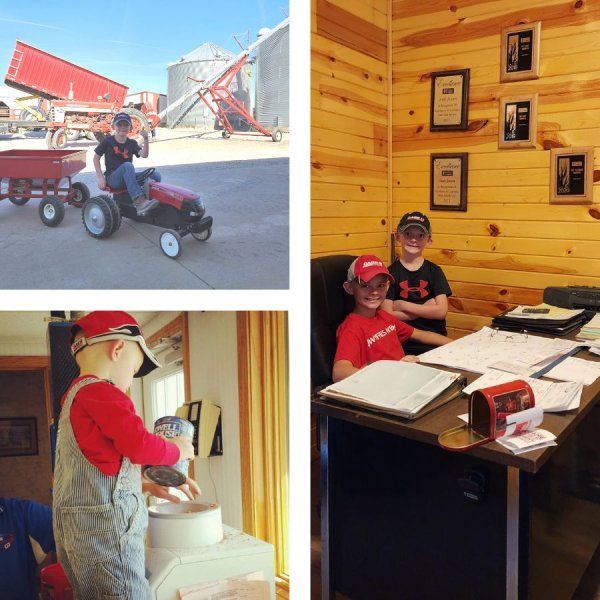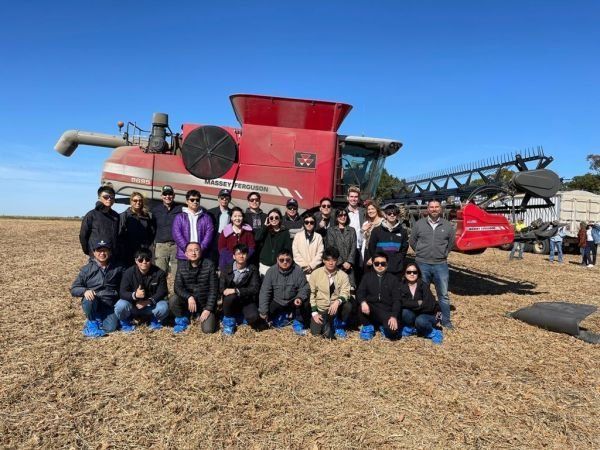Featured Article

October 27, 2022
What makes up your identity? I might introduce myself as a wife or a mother. I might call myself a Christian in some circles or identify as a farm kid in others. I probably include my county of residence to some and to others that I’m a University of Illinois alum. But only recently have I considered a new identifier – political party. There’s no secret here. Your political identity has become a new, important way to show others who you really are and what you stand for. If you say you’re a republican, perhaps we assume that you’re worried about state and national debt, government overreach, and legal abortions. If introduce yourself as a democrat, you’re probably thinking about immigration, social programs, and gun control. But what if you’re a farmer? What if the thing you’re worried about is your business and your family legacy? What if you were a farmer first and a republican or a democrat second?

October 25, 2022
While there are plenty of ways for your kids, grandkids or visiting relatives to join in on harvest with ride-alongs and chores, here are some random activities for fun they can play on the farm - during or outside of harvest time. 1. Farmer Says This game is a spin on Simon Says. One person starts by saying, farmer says, ‘[insert action here]’ and everyone must do that action. However, if Farmer makes an action request without saying, “Farmer says” anyone who does that action is out. 2. Steal the Corn Divide your group into two and assign each player a number. Each team should have a one and a two, for example. Set a boundary line for each team and place the corn in the middle. When you call out a number, that player from each team tries to capture the corn first and get it back over to their boundary line. The first person to do this without being tagged wins. 3. Hot Corn A spin on hot potato. You’ll need at least three people for this game. Start by sitting everyone down in a circle and practice tossing the item back and forth underhand. When the game begins, play music or say 'Go' and begin tossing the ear of corn to each other. When the music stops, whoever is holding the corn is out. 4.Bozo Buckets Place 6 buckets in a row vertically and draw a line for your child to stand behind. Use corn kernels or an ear of corn and have them try and get them in each bucket. If you have prizes, the more points are to the furthest bucket. 5 Farm Scavenger Hunt Make up your own unique to your house or use this generic one that’s pre-made . 6. The Harvested Corn Field is Lava Use a field that’s been harvested and grab blankets, towels, trampoline, or whatever you have to create a course. The goal is to have your children reach each item without stepping on the harvested corn field. Last one standing wins. 7. Make a corn sandbox For the little tikes, fill up a baby pool with harvested corn kernels and use it as a sandbox for some fun. 8. The Farm Office Play a game in your farm office where they pretend to run the farm and deliver. Have them write out and deliver invoices, write thank you letters to your family, have a delivery person hand deliver and hide notes throughout the house for their parents or grandparents to find later for notes of encouragement during harvest. 9. Combine Fun Guess the number of corn or beans that block the back window when you turn around. Whoever gets closest, wins a point. Play to 10.

October 13, 2022
IL Corn is focused on helping farmers use conservation practices to improve soil health, reduce erosion, sequester carbon, and build a sustainable future for generations of future farmers. "Each of these are empowered by access to chemicals like atrazine, an important tool that Illinois corn farmers cannot afford to lose," said Marty Marr in his comments to the U.S. Environmental Protection Agency on behalf of the IL Corn Growers Association (ICGA). Marr, a farmer from New Berlin and current President of ICGA, is concerned about tighter restrictions on the use of atrazine in the U.S. and voiced those concerns in a comment to the USEPA last week. “Atrazine is a critical component of weed management programs and not only provides an effective economic option but also allows the use of conservation practices such as no-till or reduced tillage and cover crops to continue and expand. These conservation practices conserve soil, improve soil health, and help mitigate the effects of climate change. The proposed changes to the atrazine label would no longer make it a top choice product and instead more costly, less effective products would need to be used or mechanical weed control measures that increase soil loss,” said Marr in the submitted comments. Impacts to farmers, should they lose access to atrazine, are significant. According to Precision Conservation Management research, if an Illinois farmer had to reinstate a 2+ pass tillage system for weed control, that farmer would lose an average of 1.39 tons of soil/acre. This would also result in greenhouse gas emissions of 1.16 metric tons CO2e/acre. The proposed rule will impact more than 70 percent of U.S. corn acres, significantly reducing application rates while also requiring additional conservation measures and reporting procedures. The rule also prohibits all aerial application as well as application during a rain or storm event or when rain is forecast within 48 hours. EPA estimates the cost to replace atrazine is $42 per acre from alternative herbicide expenses and reduced yields from poor pest control. “Again, eliminating or reducing the use of atrazine would mean choosing between the right environmental choice and most practical and economical one,” commented Marr. ICGA also encouraged farmers to submit their own comments to the USEPA docket and generated nearly 300 separate comments in support of the continued availability of atrazine. Read ICGA’s comments in full here or peruse the full list of comments from all over the U.S. in the EPA docket here .

October 13, 2022
More than 50 countries are being represented in the United States this week during the U.S. Grains Council’s (USGC) marquee event, Export Exchange, held October 12-14. Before and after the event, several delegations of foreign officials from Thailand, Taiwan, South Korea, the Middle East, and Africa, visited Illinois farms and export facilities to learn more about corn and corn co-products grown and produced within our state. Illinois farmer leaders Mark and Cristin Wilson of Toulon, Paul and Donna Jeschke of Mazon, and Art and Jason Bunting of Dwight hosted groups of the dignitaries, explaining Illinois corn farming, transportation systems, and co-product creation.

October 4, 2022
There is just something about Washington that comes across swampy. During particularly brutal heatwaves, Washingtonians like to remind themselves that of course it’s hot; after all, the capital city was built on a swamp. In recent years, voters, who have grown disenchanted with Washington, have been increasingly referring to the capital as the swamp and to its political inhabitants as creatures of the swamp. But as we look at the facts , Washington the swamp, both metaphorically and as a geographical feature, appears to exist less in reality and more as part of the popular imagination. It’s important that voters understand the circumstances as attacks on Washington can elicit the kind of cynicism that is harmful to the democratic process, as it tempts voters to vote against something they dislike rather than vote for what is in their own best interest. Don’t get me wrong. As someone who grew up on a farm in the Midwest, I understand the frustrations that can arise from burdensome policies and seemingly out of touch politicians. But I’ve also worked closely with dedicated public servants and seen firsthand their contributions in passing legislation that truly impacts lives. Rep. Sam Graves (R-MO-6), who gave me my first job in Washington, exemplifies the type of leader that makes the word “professional” honorable, not pejorative, when it precedes “politician.” He worked countless hours and made the kind of personal sacrifices it took to be there for his constituents during their times of need, such as in the aftermath of natural disasters. Rep. Graves is not alone. There are countless other politicians in Washington, who along with their staffs, embody that same kind of dedication. Often, these politicians spend years cultivating expertise in areas important to their states or districts, learning the ways of Congress and building meaningful relationships that help them deliver for the American people. Because of the dedication and the know-how of these policymakers, much has been accomplished for farmers over the years. This year alone, thanks to dedicated leaders from both parties, we secured funding to further improve locks and dams on the Mississippi River, bring high-speed Internet service to rural areas and provide upgrades to biofuel infrastructure. Even those who may understand the value public policymakers bring to the table still holdout criticism for another creature of the swamp: the Washington lobbyist. Yet almost everyone who criticizes lobbying has dedicated lobbyists working on his or her behalf. You’re a senior citizen? You got the AARP. You’re a person of faith? You have a variety of faith-based organizations. You’re a farmer? You’ve got groups like mine, working on your behalf every day. Lobbyists play an important role in educating policymakers and their staff on important issues and ensuring all potential outcomes of an action, both direct and indirect, are considered. Agricultural industry lobbyists are constantly on the forefront making sure you have a seat at the table. This type of representation will be important as we begin to debate reauthorization of the Farm Bill in 2023. As the anti-Washington rhetoric increasingly becomes a permanent feature of our national discourse, I worry about the toll it is having on our leaders in Washington. For example, Rep. Graves, who came to Washington in 2001, is the last Republican member of his class still in Congress. And many Washington leaders have cited divisiveness as a reason for their early retirements. A lot of institutional knowledge and background about these important issues goes away with these retiring members. But with the right information in hand, and awareness, I am confident educated voters can help us reverse course. As we approach the November elections, and the anti-swamp drumbeat grows louder, we’re going to hear less about the issues that are important to you and more about what you should hate about the mythical creatures of Washington. My hope is that you and other voters will look beyond the distractions and focus instead on examining the experience of political candidates, their stances on agricultural issues that impact you directly and carefully consider whether they can get things done for you in Washington. To do this, though, you must first and foremost vote. You can find more information about registering and polling locations here: https://vote.gov/ . See you at the polls! Appleton is vice president of public policy at the National Corn Growers Association.
Articles
2026
2025
2024
2023
2022
2021
2020

